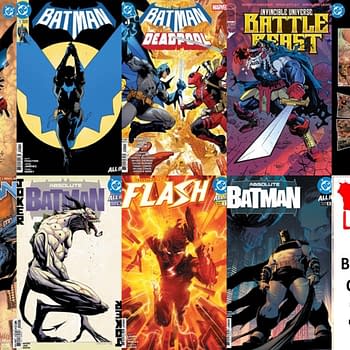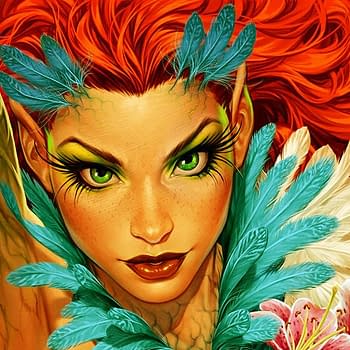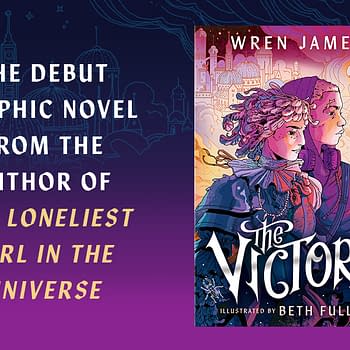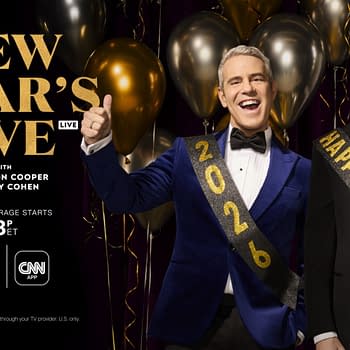Posted in: Comics | Tagged: 9 lives, British Library, Comics, comics unmasked, dave mckean, entertainment, music, song
Nine Lives Lived In Full With Dave McKean At The British Library
This weekend, I went to the British Library in London to see Dave McKean sing and play the piano.
To most he is an artist, whose work is often associated with the comics industry. His most prominent and widely seen pieces right now are the covers to Sandman Overture. Others will remember the graphic novel he wrote as well, Cages, for me one of the highest achievements of the comics art form. And others will remember that he designed and directed the movie Mirrormask.
But this true Renaissance Man of comic books does so much more. Last year at the Sydney Opera House as part of the Graphic season, he put on a performance called 9 Lives, consisting of nine short films to which he and a small orchestra would perform the words and music. And each was stylistically so different, a combination of animation and live action and a Dave-McKeany-somewhere-in-betweeny.
It was this performance he reprised at the British Library as part of the Comics Unmasked: Art And Anarchy In The UK exhibition that he designed which, according to Paul Gravett who introduced the show is breaking the Library box office records. You can see snippets here of the performance at the Sydney Opera House. The London reprise was smaller, closer, more intimate, as may be more fitting for these works.
The first, a fixed CGI scene, saw a hotel named Tempest, slowly being flooded as the rains fell, people leaving the streets for the rooftops, fish and jellyfish arriving, as Dave talked and sung about the changes in town and country life to the refrain of "Ring A Ring A Raindrops", with violin, viola and cello pizzicating the rain drops while Iain Ballamy on sax took the flow of the emerging river.
The next, His Story, is probably the closest you might associate with McKean's better known work, people as Henry Moore sculptures, ideas of story solidified, here as a glass-like sharp slice embedded in the head of a child, from the father, and a personal story of how a child relates to the world as seen by a parent and how it affects their own view and influences their actions through their life, even after the parent has passed away.
Admitting the influence of Dennis Potter's Blue Remembered Hills, it was possibly Sheep Dip, Johnson And Dupree that stuck with me most, stories of children messing about in fields and town, bonding as children can, being as cruel as children can, portrayed as adults with huge McKean masks to recreate the proportions of a child's body, sung with every line ending in an "ee" and reprising the names/nicknames of the three boys playing together. In Battersea. As ever, the more specific it is to Dave, the more resonant it can be felt my the audience and I was right back to playing with kids in the local beck, fishing for minnows…
And snapped back with a jolt as McKean lipsynched himself appearing on the screen to define himself as an unreliable narrator. Charming, beautiful and oh-so effecting.
Neon was a ghost story, horrible confusing at first until you realised that all the pieces just need to be seen, and heard, from the right angle. Made in 2000, and originally voiced by John Kale, it contains many of McKean's tropes, the off kilter haunting masks, the city as a character and as a holding pen, the blurring of people – here literally into ghostly forms, and the agendas that we have in life that may follow us into death.
We had two sequences from his upcoming feature film, Luna. The first, Mixed Metaphors, was the title sequence, rotoscoping people, birds, crabs, fish, into ink washed drawings, as a paper aeroplane launches over a city and we follow its journey, leaping through the air to the saxophone. While McKean plays the piano, I couldn't help but help feel that his signature sounds is now Bellamy on the sax, composer and performer on Mirrormask. Because this was the most Mirrormasky film of the night. I'm guessing he may have rubbed his beard quite a bit when McKean saw the Paperman short, but this is stylistically so different.
The second clip from Luna was a re-edited scene to a song and a soundtrack sung and played by McKean. He told us that, in its long production periods, he is very grateful to actors Ben Daniels and Stephanie Leonidas for helping promote the movie by becoming a lot more famous since filming it. A story within a story, he tells of a quilt of guilt, one side portraying perfection, the other of hidden, terrible secrets, and the effect that telling an old story can have, fresh and new.
Talking about how fine art hates a story, but how that's all he's interested in telling, he took an art exhibition, The Coast Road, in which a series of letters saw estranged wife Susan tracking down her departed husband Peter through various artworks that he'd managed to be captures by as he travelled the coast of England – and then turned that exhibition narrative into a short film voiced by Jan Francis and music that flips from matching the South Coast seaside scenery to the Latin dance lessons that Peter would give to make money as he travelled.
This enabled McKean to create all manner of artworks in variety of styles, reflecting different artists and different landscapes, the dark beach huts with faces staring from somewhere beyond along the walls as if they were portals to someone else, contrasting with the whites of the sand was a favourite.
We also had June, McKean's silliest most flippant piece of the night.
A song created by friends, now animated, about June, a woman who the singer meets at a Christmas party and drops a mince pie in her cleavage. In Stevenage. And how that one event forever frames the way he sees her as the months fly by from December to… June. I laughed, as I'd done repeatedly through the evening, even if the mood expressed was often sombre, the humanity was recognisable and humour often intrinsic.
We ended with The Cathedral Of Trees, again looking at McKean's fascination of the borders between two worlds, here civilisation and the wild forest, the movement between the two, the preparation for the journey and the consequences of taking it. It was possibly the most literal expression of that theme, but one present in most of them, whether that's the past and the present, the town and the city, the living and the dead, the young and the old, the land and the sea, we do like to live to the borders.
McKean joked that he wanted to leave the audience always wanting less. In that regard he utterly failed. This performance was on for two nights in London and is unavailable in any other form. But I want to see it again. And I can't. I have memories, on the border of presence and absence.
Somebody should do something.
The Comics Unmasked exhibition, and events, continue until mid-August.





















